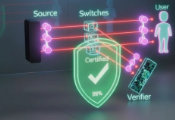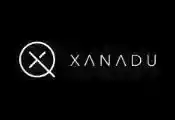Canada’s Nord Quantique Selected for 2nd Phase of DARPA Quantum Benchmarking Initiative
SHERBROOKE, Canada, November 06, 2025 -- Nord Quantique, a pioneer in the field of quantum error correction, today announced it has been invited to participate in Stage B of DARPA’s Quantum Benchmarking Initiative (QBI). The company has signed a contract worth $5 million, with the possibility of an extension of the agreement up to a total of $15 million.
The QBI is designed to determine if utility-scale quantum computing can in fact be achieved by the year 2033, with a handful of companies from around the world being invited to Stage B. This second phase of the QBI is based around research and development, outlining plans to deliver a utility-scale quantum computer and identifying some of the challenges along the way.
“Our team worked diligently to deliver on Stage A of the QBI. We are very pleased to see that those efforts have paid off in the form of an invitation to participate in Stage B,” said Julien Camirand Lemyre, CEO and Co-Founder at Nord Quantique. “We are the only company pursuing a scalable approach to quantum error correction using superconducting cavities and bosonic codes to achieve a 1:1 logical qubit ratio. Consequently, we view our participation in Stage B as yet another validation of our unique approach to quantum computing. Our team is now more motivated than ever, and we’ll be delivering some big things in the coming months.”
Nord Quantique has developed multi-mode bosonic qubits that encode quantum information using multiple microwave frequencies within a single qubit. This intrinsic redundancy enables correction of multiple error types—including bit flips, phase flips and control errors—during computation. Unlike competing technologies that often require a thousand physical qubits or more to correct each logical qubit, Nord Quantique’s approach achieves a 1:1 ratio of physical to logical qubits, allowing the company to scale its quantum error correction technology to utility-scale systems.
All companies selected for Stage B will be required to secure additional funding if they wish to negotiate a contract above $5 million in value. To that end, the government of Canada has announced provisions in support of the country’s quantum industry in its federal budget, released earlier this week. All of the capital Nord Quantique is receiving represents revenue from work delivered through contracts and does not give government entities an equity position in the business or dilute the company’s equity in any way.
Stage B of the QBI program will last approximately 1 year, with the objective of providing a detailed R&D roadmap to highlight how participating companies will reach utility scale quantum computing by 2033. Special attention will be paid to identifying possible risks on these roadmaps, and how these will be addressed, to keep development on track. Acceptance into Stage C, the final phase, hinges on proving that the technical risks have been sufficiently mitigated through prototype validation and component development, that the company is ready to move forward with actual construction and final design of the utility-scale quantum computer. Those selected for Stage C may be eligible to receive up to $300 million USD if it is determined that utility scale quantum computers can be built based on their design and operate as intended.
Nord Quantique will release impressive results related to its ongoing efforts to scale up the number of logical qubits in its system over the winter.




































